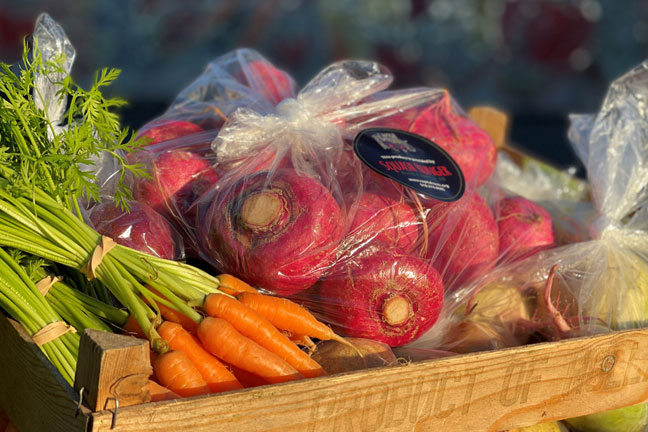February 7, 2023
RPI research, supported by the National Science Foundation, aims to connect regional food hubs, and farmers, to address food insecurity and inequity
Food access is one of the largest social problems in the United States. The challenge of accessing healthy foods is especially pronounced in communities of disadvantaged populations. Research led by Rensselaer Polytechnic Institute (RPI) proposes to develop a local food cooperation (LFC) program that integrates a state-level food hub network to enable the coordination of multiple regional food hubs, and regional farm to institution programs that address regional food insecurity and inequity.
The research — led by Cara Wang, professor of civil and environmental engineering at RPI — is supported by a $50,000 grant from the Civic Innovation Challenge, a multi-agency, federal government research and action competition that aims to fund ready-to-implement, research-based pilot projects that have the potential for scalable, sustainable, and transferable impact on community-identified priorities. The Challenge is supported by the National Science Foundation, in partnership with the U.S. Department of Energy and the U.S. Department of Homeland Security.
A total of 52 projects were selected for Stage 1 funding. In early 2023, teams from this stage will resubmit to Stage 2 for the opportunity to receive $1 million, one-year awards to implement their pilot projects.
The Rensselaer project, titled “A Coordinated Food Hub Network and Farm to Institution Program: Building Bridges between Small Local Farmers and Institutions in New York State Capital Region,” is being done in partnership with two regional food hubs — Capital Roots from New York’s Capital Region and Headwater from the Rochester area — to answer the research questions, and test potential solutions.
According to Wang, small local farmers and producers of healthy foods struggle to make a living. In states across the country, the numbers of family-owned food producers have steadily declined since the 1960s. The proposed LFC program would provide a platform for information exchange and, possibly, trading so that food hubs in different regions can collaboratively leverage the surpluses to provide a stable supply. The program will also enable local food processors to process and pack food at a competitive price.
“The program would be able to engage regional distributors to use their distribution and transportation capabilities and local resources to efficiently connect supply and demand,” Wang said.
The project aims to significantly improve the state-of practice of food supply chain operations by integrating pioneering research into a community-based program. It will also contribute to the state-of-art of freight demand forecasting, as the project will use newly collected food production and consumption data to enhance existing freight production models, making them more accurate in predicting food production and consumption, and institutional consumer behavior.

